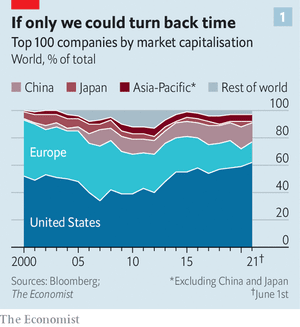Commenting on a recent chart published by The Economist showing Europe’s declining economic share, economist and a co-founder of Seed consultancy, JP Fabri, points towards the need for Europe to lower administrative burdens on SMEs, among other areas for improvement.
The chart shows that since the 2008 financial market crash, Europe’s economic global economic share has continued to decline, both on a macro level, in terms of GDP, and a micro level, in terms of market capitalisation.
Commenting on the latest figures, Mr Fabri points out that the European Union “needs to really look into why European companies and the economy are lagging behind and constantly losing their share in the world”.

He added that “as a continent, we [Europe] need to lower the administrative burden on our SMEs, digitally transform as a society, improve access to finance, allow start-ups to thrive and facilitate entrepreneurship including easier insolvency procedures.”
“Europe, quo vadis? [Europe, where are you going]”
Mr Fabri concludes by calling for COVID to act as the trigger required to build a better European economy.
Indeed, the share of EU companies among the largest in the world has been declining for years. In the same report by The Economist, it was noted that:

“In 2000, nearly a third of the combined value of the world’s 1,000 biggest listed firms was in Europe, and a quarter of their profits. In just 20 years, those figures have fallen by almost half.”
The Economist argues that Europe has often held the global top position for drawing up rules and regulations companies must follow, such as in digital privacy and environmental protection. In addition, since the area remains a fractured economic zone, separated by barriers set up by national Governments, as well as language and cultural barriers, challenges remain in pushing the continent to become a friendlier place to start or run a business.
The leading economic publication also illustrates this point by highlighting how big EU companies have preferred to expand their sales and operations overseas in recent decades rather than in their home base.
Malta’s youth population down by 15,000 in 10 years: What does this mean for the labour market?
'The challenge today goes beyond attracting talent – it’s about retaining it'
MBB urges caution over EU’s 2040 climate targets, citing risks for Maltese businesses
'The proposed target presents both opportunities and challenges'
db Foundation raises €8,419 for Karl Vella Foundation with MasterChef Malta Charity Dinner
These events form part of the db Foundation's ongoing commitment to supporting vulnerable members of society through impactful initiatives






